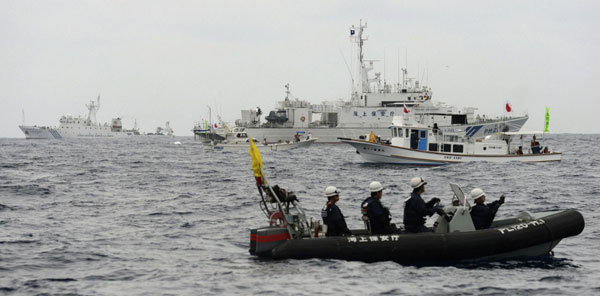
The 1945 Potsdam Proclamation, a statement of terms for the unconditional surrender of Japan issued in the names of the United States, China and the United Kingdom, determined that the terms of the Cairo Declaration shall be carried out, including that China's northeast regions, Taiwan Island, Penghu Islands and its surrounding islands, should return to China.
 |
|
Chinese marine surveillance ship Haijian No. 46 (L) tries to approach towards Japanese fishing boats (2nd and 3rd from front) while a Japan Coast Guard boat sails (front), in the East China Sea, near Diaoyu islands, in this photo taken by Kyodo May 26, 2013. [Photo/Agencies] |
The Diaoyu Islands are not within the Japanese sovereignty outlined by the declaration.
Mei Zhaorong, former Chinese ambassador to Germany, said this document is historical and legal evidence of China's ownership of the islands, while Li's presence there warns the Japanese right-wing forces not to try to deny the achievements of the world anti-fascist war.
Tokyo last September illegally "nationalized" the Diaoyu Islands, which have belonged to China — one of the victors of World War II — for centuries. Japan's relations with China and South Korea became further strained under the hawkish Abe administration, which vowed to hike defense spending and loosen restrictions of the 1947 pacifist constitution.
Meng Hong, an expert on German studies at Renmin University of China, said the venue highlighted a sharp contrast between Japan and Germany's self-reflection on its crimes during World War II.
"Germany has thoroughly repented while Japan is still messing around," she said. "But Japan cannot erase its crimes."
Meng said the Potsdam Proclamation also marked the beginning of China's participation of dealing with international affairs through negotiation. "China, now a major global power, aims to underline the importance of peaceful communication in the face of disputes," she added.